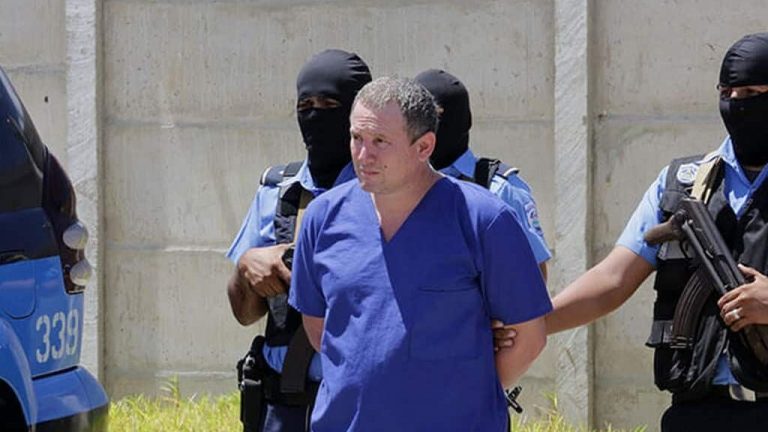7 de enero 2020

Children of Exile: The Births “Sowing Hope” in the Camp of Nicaraguan Farmers

PUBLICIDAD 1M
PUBLICIDAD 4D
PUBLICIDAD 5D
Next week, relatives of political prisoners will form a new board of directors to define their action plan for obtaining the release of the remaining

At least 60 political prisoners remain in Nicaragua’s jails
At least 60 political prisoners remain in Nicaragua’s jails, following the release of 91 prisoners of conscience last December 30. Given this panorama, relatives of those still in jail are planning to define an “action” plan for 2020 in the next few weeks, with the goal of demanding the liberation of their loved ones.
Among the political prisoners that are left, some have been in the regime’s cells for over a year. Such is the case of Luis Carlos Valle Tinoco, 32.
According to information compiled by the Civic Alliance for Democracy and Justice, Valle was detained in his home on July 3, 2018. Following his arrest, he was accused of aggravated robbery and illegal arms possession.
Despite the fact that the regime of Daniel Ortega released a sizable number of political prisoners in 2019, Valle didn’t figure in the lists disseminated by the Ministry of Interior. Because of that, he’s now one of the political prisoners with the longest time in jail. His relatives assert that his only “crime” was to have participated in a protest held on April 20, 2018, in the Managua neighborhood known as Bello Horizonte.
Through the lists published by the social movements, Confidencial was able to confirm that 16 of the political prisoners detained by Daniel Ortega’s regime in 2018 are still in jail.
“My brother is suffering”
Eduardo Lacayo is going through a similar situation. He was taken prisoner on March 15, 2019, and the regime has refused to free him on two occasions: first, when the Amnesty Law passed; and second, on this past December 30.
Karen Lacayo, Edward’s sister, told Confidencial that she would continue “in the struggle” to demand the liberation of her brother, who was accused of drug trafficking by Nicaragua’s justice system (police, prosecutors, judges).
“We demand more pressure from everyone, from the Civic Alliance, from Monsignor Waldemar Sommertag, the Apostolic Nuncio. There are more actions that we must undertake for the prisoners that are still left,” Lacayo assured.
Following ten months without having her brother at home, and after participating with other mothers and relatives of the political prisoners in a hunger strike that was held in the San Miguel Church in Masaya, Karen Lacayo declared that in 2020 they’ll exert more pressure for the liberation of all the political prisoners.
“That’s the perspective we have for this year: to hold actions all year, with the goal that every last political prisoner gets out,” she declared.
Edward Lacayo remains in the men’s prison known as “La Modelo”, one of more than 80 political prisoners who were accused of supposed common crimes. Because of that, they weren’t “benefited” by the Amnesty Law, which was approved at the beginning of June by the FSLN legislators who hold an overwhelming majority in the National Assembly. Now, he’s also one of the more than 60 prisoners who weren’t released on December 30.
Edward is considered “a true leader” in Monimbo, the Masaya neighborhood he resides in. During 2018, he was in the trenches and barricades of this historic indigenous neighborhood. At the time of his capture, he was headed towards Costa Rica, where he was scheduled for an interview with an international media source.
“My brother is suffering. All of those still left behind bars want to get out, because they’re innocent. And it’s not right that they’ve left them there. I’m not going to stop fighting. I’m going to insist until the last political prisoner gets out,” stated Karen Lacayo.
Relatives demand total liberation
Diana Lacayo, mother of Scannieth Merlo Lopez, who was released on December 30, is the current president of the Association of Family Members of Political Prisoners. She affirms that a new board of directors will be selected in the next weeks, made up of family members of those prisoners that are still in jail.
“There are some mothers who are concerned by that situation [the turnover in leadership], because not all of them are visible, and some are afraid that the regime will do something to them,” Diana Lacayo commented.
The Association was created in such a way as to have the directive board rotate as the regime liberated the prisoners. That is, Diana Lacayo will cede her post to other family members that are still demanding freedom for their loved ones. However, she assured that the struggle doesn’t depend on a position. “If I need to work from below, I’ll do so. I don’t necessarily have to be a member of the board to be able to struggle for each one of our kids,” Lacayo declared.
“To go out on the street, confront the regime and not be afraid of them has influenced the international community to impose their sanctions and succeeded in having them free the majority of our political prisoners,” she added.
Archivado como:
PUBLICIDAD 3M
Periodista nicaragüense con tres años de trayectoria en cobertura de temas culturales y derechos humanos. Ganador del Premio Pedro Joaquín Chamorro a la Excelencia Periodística.
PUBLICIDAD 3D